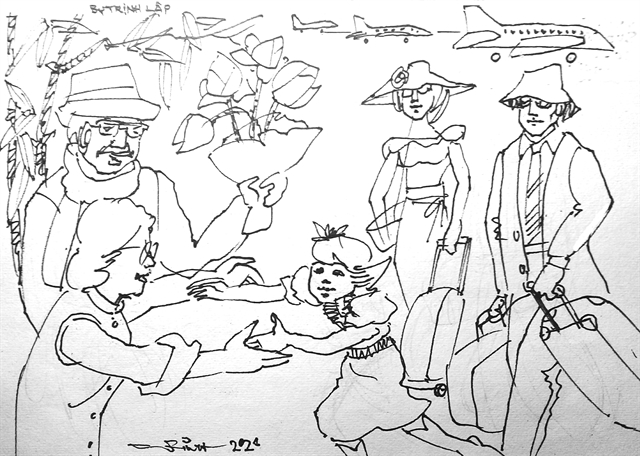 Talk Around Town
Talk Around Town

Việt Nam was a land so many wanted to leave, mainly due to economic difficulties, but now is a land many want to return to. This is not to brag about the country’s effective control of COVID-19; it’s about the community spirit, supporting people in need.

|
| Illustration by Trịnh Lập |
by Nguyễn Mỹ Hà
We’re living in strange times, witnessing a reality beyond imagining a few decades ago. Border guards have been ordered to be on the alert and tighten patrols along land and sea borders, not to prevent people leaving but to prevent them from coming in illegally.
This will prevent the spread of COVID-19 in the community.
In the late 1970s and 1980s, the issue of Vietnamese 'boat people' was a global humanitarian concern. Hundreds of thousands or more would board wooden boats, put their lives and the lives of their loved ones at the mercy of the sea, and hope to reach international waters and be picked up by passing vessels, then spend a few years in a camp in Hong Kong, the Philippines, or elsewhere, until a host country agreed to take them in.
The number of Vietnamese boat people who died at sea can only be estimated. According to the United Nations High Commission for Refugees, between 200,000 and 400,000 didn’t complete the journey.
In Việt Nam, one of the best-known boat people, who put his family on a boat and sadly lost his wife at sea, was singer Ngọc Tân.
He paid many taels of gold for places on a boat and set out from Hải Phòng Port in the dead of night. He was later reported to have told friends: “After we left the shore, we suddenly heard fish jumping into the boat. A storm raged and the boat ended up in pieces.” He lost his wife to the storm and had to return to Việt Nam, according to close friend and writer Châu La Việt.
“Illegally crossing the border”, or “vượt biên”, was regarded as a crime in the 1980s. There was no trial, but you would never be able to get a coveted government job.
Ngọc Tân trained as a singer at the Hà Nội Conservatory of Music, but no band or art troupe would take him after his illegal trip.
Việt wrote that he took on the pseudonym Bảo Hà, a combination of his son and late wife’s names, and found work. But when billboards were put up with his new name, someone wrote over the top “Bảo Hà is in fact Ngọc Tân”, and the troupe let him go and removed his name from the performance programme.
Ngọc Tân had a beautiful tenor voice and after his personal tragedy it seemed to become even smoother and take on a “weeping” element, winning the hearts of so many listeners.
For a few years after his failed runaway attempt, he made a living buying and selling machine parts. He was actually quite good at it.
Then, in 1994, eight years after Việt Nam introduced its open-door policy, Ngọc Tân headed south to the embracing arms of the Bông Sen, or Lotus Performing Art troupe.
Times had changed, as had policies. After making his name known in the south, he headed north to a warm welcome from his fans in Hà Nội and nearby.
“Ngọc Tân, from the top of a mountain to the bottom of an abyss,” as Việt wrote, sums up the brief yet dynamic events of his life, which brought him even closer to fans but also brought him down to the pit of despair.
In recent years, a flow of Hoa minority people, of Chinese origin, who had left Việt Nam in the late 1970's, have come back to the country to reconnect with relatives, neighbours, and friends.
Before the brief border war between China and Việt Nam broke out in February 1979, many Hoa whose family had lived in Việt Nam for generations looked to get out, first, they thought, to China. But they ended up elsewhere, and life took a different turn.
Politics change, but the human feeling for those who are close, who were kind to them, lasts much longer than any policy ever can.
Việt Nam was a land so many wanted to leave, mainly due to economic difficulties, but now is a land many want to return to. This is not to brag about the country’s effective control of COVID-19; it’s about the community spirit, supporting people in need.
Of course, there are always those who would fit in better in another society. The same thing happens to citizens from the developed world. Many find their lives more eventful or useful once they step out of their comfort zone.
So, what is this column “about”? It’s about opening your mind, and your eyes, to see changes you previously thought impossible.
Under any and all circumstances, be kind, be courteous, and be supportive, because you never know when you may need these from someone else. VNS